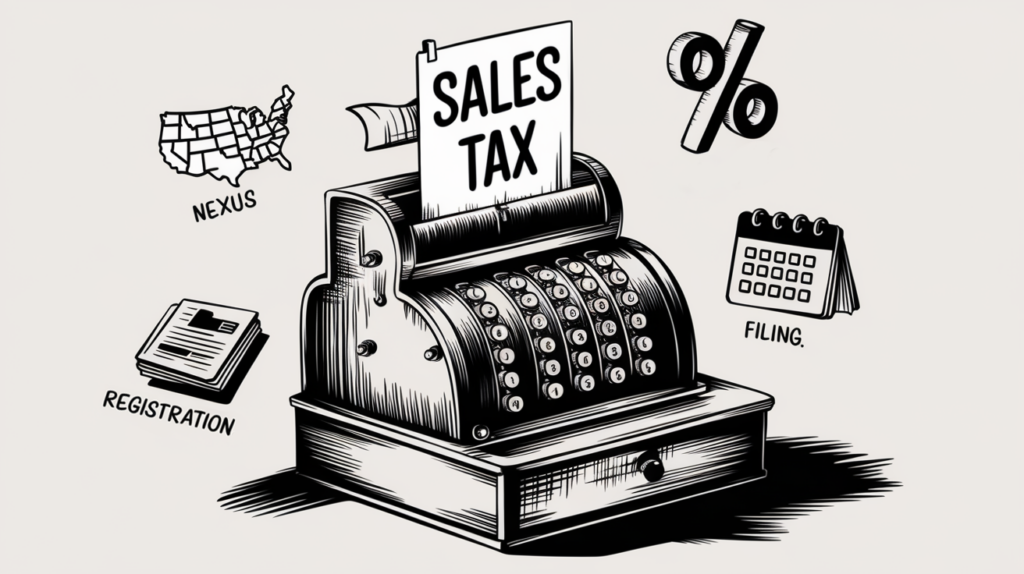The internet has revolutionized commerce, allowing businesses to reach customers across state lines and even internationally. This expanded reach brings incredible opportunities but also new complexities, particularly when it comes to sales tax. For online sellers, understanding and complying with various state sales tax laws is crucial for avoiding penalties and maintaining a healthy business. At XOA TAX, we’re here to help you navigate these challenges.
Key Takeaways:
- Nexus determines your obligation: Having a physical presence or significant business activity in a state creates “nexus,” requiring you to collect sales tax there.
- Economic nexus is key for online sellers: Even without a physical presence, exceeding a state’s economic threshold (sales volume or transaction number) creates nexus.
- Sales tax rates vary: Rates differ by state and even by locality.
- Proper registration is essential: Register with the appropriate state tax authorities before collecting sales tax.
- Accurate record-keeping is vital: Maintain detailed records of sales, tax collected, and exemption certificates.
- Marketplace facilitator laws impact your responsibilities: Selling through platforms like Amazon or Etsy may shift some sales tax obligations.
Understanding Sales Tax for Online Businesses
While the rules governing online sales tax can seem complicated, let’s break them down into manageable steps.
1. Determining Nexus
Nexus is the connection between your business and a state that triggers the requirement to collect sales tax.
- Physical Presence: This is the traditional form of nexus, established by having a physical presence like a store, office, warehouse, or employees in a state.
- Economic Nexus: With the rise of e-commerce, states implemented economic nexus laws. This means that even without a physical presence, if your sales exceed a certain dollar amount or number of transactions within a state, you’re required to collect sales tax.
- Economic Nexus Thresholds: These vary by state. For example:
- California: $500,000 in taxable sales
- New York: $500,000 in sales and 100 or more transactions
- Texas: $500,000 in sales
- For more states
- Economic Nexus Thresholds: These vary by state. For example:
2. Understanding State and Local Tax Rates
Sales tax rates are not uniform. They can differ significantly from state to state and even within a state, depending on city, county, or special district rules.
3. Registering for a Sales Tax Permit
Once you have nexus in a state, you must register with its tax authority to obtain a sales tax permit, allowing you to legally collect sales tax from your customers.
4. Managing Sales Tax Collection and Filing
This involves several key steps:
- Calculate tax: Use the correct rates based on the buyer’s shipping address.
- Issue receipts: Provide customers with detailed receipts showing the tax amount.
- File returns: Submit sales tax returns to each state where you have nexus, adhering to their deadlines.
- Filing Frequency: This varies by state and sales volume. You might need to file monthly, quarterly, or annually. Check with each state’s tax authority for specific requirements.
5. Addressing Tax-Exempt Sales
Certain sales may be exempt from sales tax, such as:
- Resale: Sales to businesses that will resell the items.
- Exempt Organizations: Sales to certain non-profit organizations.
- Specific Products: Some states exempt specific items, like groceries or prescription drugs.
To claim exemption, you’ll need to collect and maintain valid exemption certificates from buyers.
6. Navigating Marketplace Facilitator Laws
Many states have enacted marketplace facilitator laws. This means online marketplaces like Amazon, Etsy, and eBay are responsible for collecting and remitting sales tax on behalf of third-party sellers.
- Impact on Sellers: If you sell through these platforms, understand your state’s marketplace facilitator laws, as they may affect your sales tax obligations.
7. Streamlining Compliance with Software
Several software solutions can automate sales tax calculations, filing, and record-keeping. These tools often integrate with popular e-commerce platforms like Shopify and WooCommerce, making compliance much easier.
FAQs on Sales Tax for Online Sellers
Q: Do I need to collect sales tax if I only sell digital products?
A: While some states don’t tax digital goods, an increasing number are implementing taxes on digital products like software, e-books, and online courses. Check the specific laws in states where you have nexus.
Q: What happens if I don’t comply with sales tax regulations?
A: Non-compliance can lead to penalties, including back taxes, interest, and even legal action. It’s crucial to prioritize sales tax compliance.
Q: What records do I need to keep for sales tax purposes?
A: Maintain detailed records of all sales transactions, including:
- Invoices
- Sales receipts
- Exemption certificates
- Tax returns and filing confirmations
Q: Are there resources to help me stay updated on sales tax changes?
A: Yes, subscribing to newsletters from state tax agencies or utilizing sales tax compliance software can help you stay informed about changes in legislation.
Need Help with Sales Tax Compliance?
Sales tax can be a complex area for online sellers. At XOA TAX, our team of experienced CPAs can help you:
- Understand your nexus in different states
- Determine accurate sales tax rates
- Register for sales tax permits
- Manage sales tax collection and filing
- Stay compliant with marketplace facilitator laws
- Minimize your sales tax liability
Contact us today for a consultation:
Website: https://www.xoatax.com/
Phone: +1 (714) 594-6986
Email: [email protected]
Contact Page: https://www.xoatax.com/contact-us/
We’re dedicated to helping you navigate the complexities of sales tax so you can focus on growing your online business!
Disclaimer: This post is for informational purposes only and does not provide legal, tax, or financial advice. Laws, regulations, and tax rates can change often, and vary significantly by state and locality. This communication is not intended to be a solicitation and XOA TAX does not provide legal advice. Please consult a professional advisor for advice specific to your situation.




 anywhere
anywhere  anytime
anytime